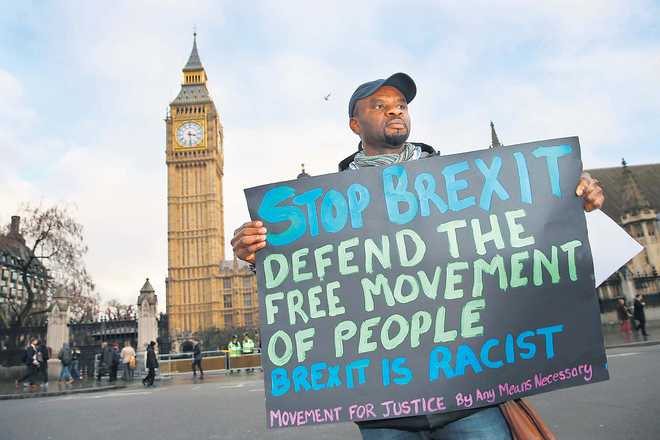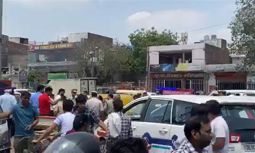
IN BLACK & WHITE: Coloured migrants continue to deal with social bias.
Hasan Suroor
TO most Commonwealth leaders now back home and busy with domestic issues, the London summit would already be a distant memory. But for their British hosts it would be harder to forget it in a hurry. What was intended to be a grand final curtain call for the Queen and an opportunity for Britain to rebuild relationships with its former colonies ahead of Brexit turned into a PR disaster thanks to a series of embarrassing events coinciding with the summit. They left behind an image of a Britain still driven by deep-seated racial prejudice, and the colonial idea of a “fraternal” White Commonwealth (Australia, New Zealand, Canada) and a culturally alien “coloured” Commonwealth comprising its former colonies in Asia, Africa, and the Caribbean.
So, we had the astonishing spectacle of the Commonwealth’s new head-designate Prince Charles questioning the Britishness of a well-known British writer of Indian origin on the basis that she wasn’t the right colour. Anita Sethi, who was born and brought up in Britain, was introduced to the Prince at the Commonwealth People’s Forum. Almost the first thing he asked her was where she was from.
“Manchester,” she replied. “Well, you don’t look like it,” he said before laughing and walking away. What he was saying in effect was: “You can’t be British because you’re not white.” Sethi said she was “stunned”. “That the mooted next leader of an organisation that represents one-third of the people on the planet commented that I, a brown woman, did not look as if I was from a city in the UK is shocking,” she said.
In just one gaffe Charles had undermined confidence in his and, more broadly, Britain’s ability to lead a multi-racial and multicultural body. And it left many wondering about his professed commitment to the Commonwealth’s “unique diversity”. His insensitive remark — an example of casual racism that every person of colour faces on an almost daily basis — fed into the outrage over another racially charged episode that nearly derailed the summit.
Leaders from the so-called “black” Commonwealth were furious when it emerged that hundreds of lawfully settled Caribbean immigrants had been suddenly declared illegal as part of a government policy to create a “hostile environment” for migrants. It was devised by PM Theresa May in her previous avatar as Home Secretary in her obsessive pursuit of cutting down immigration from non-European countries to pander to tabloid headlines, and appease grassroots Tory voters drifting towards the xenophobic United Kingdom Independence Party (UKIP).
An unintended consequence of the attempt to create a “hostile environment” was that it became kosher to target anyone who — as per Prince Charles’s definition — didn’t “look” British. In other words, all people of colour came to be deemed potentially illegal until they were able to prove otherwise . It’s significant that Home Office vans with billboards telling “illegals” to “go home” were sent only to areas of high-density African and Asian immigrants from mostly Commonwealth countries.
Immigrants from the Caribbean Commonwealth caught up in the row came to Britain legally between 1950s and 1970s, many as young dependants of workers who were invited by the British government to help meet post-war labour shortages and were given British passports. Known as the “Windrush generation”, named after the ship that brought them to Britain, they have lived in Britain ever since (working, paying their taxes, and enjoying full legal rights as any other British citizen) only to find their world turned upside down overnight — their jobs gone, benefits blocked, and access to social services like healthcare denied. Some were locked up in detention centres, and threatened with deportation.
As the full scale of the scandal unfolded, revealing what the Labour leader Jeremy Corbyn described as “something rotten at the heart of modern Britain”, angry Caribbean leaders lined up to demand an explanation forcing May to offer a grovelling public apology. Since then, migrants from other Commonwealth countries, including India, have reported similar problems. Nobody feels safe anymore. Indeed, Indian expats have been here before. They had their own “windrush” moment a few years ago when the eligibility criterion for high-skilled category workers from non-European countries was quietly changed with retrospective effect so that even those who were in Britain legally under old rules were required to legalise their status afresh. Indians were the hardest hit and many were forced to return home just when they were starting to settle in.
Arguably, Britain has come a long way since Enoch Powell’s brand of racism (ironically the row coincided with the 50th anniversary of his infamous “rivers of blood” speech) but deep down a whiff of racism still exists when it comes to dealing with coloured migrants.
Coming back to the summit, it was perhaps the first time that a Commonwealth leaders’ gathering was held against the background of such deep distrust of the host country. May had invested a great deal of personal capital in hosting it. The idea was to seek closer ties with “old friends” and put the Commonwealth at the heart of an inclusive and “global Britain” ahead of leaving the European Union. Instead, she found herself dragged into a desperate damage-limitation exercise. Besides offering cringing mea culpas to the Caribbeans, she also had to assure other Commonwealth leaders and address their anxieties around immigration.
India, particularly, has been concerned about Britain’s increasingly hostile, and “discriminatory”, visa regime which has hit Indian students and workers. It has become a major sticking point in bilateral relations with New Delhi demanding a more favourable dispensation in return for the sort of closer post-Brexit relationship Britain is seeking. Given Britain’s desperately existential need to cultivate new trade relationships after losing access to the 500-million strong European single market, it might even give in. But the question being asked in the wake of the “Windrush” scandal is: what’s the guarantee that another British PM working to a different agenda would not renege on any deal that May now agrees to get herself out of the Brexit hole?
The damage done to the UK-Commonwealth relations by recent events has triggered calls for Britain to fundamentally reappraise its historical attitude toward its former colonies, and stop treating the Commonwealth as “Empire 2.0”, simply a collection of its erstwhile subjects. If it’s serious about reviving the Commonwealth, it will have to learn to start treating its other 52 members as equal partners and extend to them the courtesies they are entitled to as independent sovereign nations.
The writer is a London-based commentator



























